Bluehost vs WP Engine: which is best for your WordPress site?
A website is essential if you’re conducting business online. If you’ve created your website through WordPress, you’ll want to use WordPress-optimized hosting. Both Bluehost and WP Engine can get you the hosting you need, but which is the best web host for online business? Let’s compare Bluehost vs WP Engine
Bluehost vs WP Engine: which is the best web host for online business?
Bluehost has been around longer than WP Engine, and has garnered a positive reputation over the years. Originally just providing regular hosting, Bluehost began to branch out into WordPress hosting options as WordPress began to surge in popularity. (WordPress now accounts for over 455 million websites, which equates to approximately 37% of all websites and 63% of all content management system (CMS) sites. WordPress is no longer just a blogging platform, but is now a viable option for those considering serious online business.
WP Engine, on the other hand, was built from the ground up for WordPress hosting. As WordPress began to grow, companies like WP Engine recognized the need for managed WordPress hosting that could address all the specific needs of WordPress sites.
WP Engine is the higher-end option here, completely optimized for WordPress. It’s one of the most well-known managed WordPress hosting options. Bluehost, on the other hand, has garnered much of its business by offering more flexible and affordable hosting plans and a new WordPress-specific managed plan.
What is managed WordPress hosting?
There are a lot of hosting options out there. Managed WordPress hosting is an all-in-one hosting service where the hosting company handles your SSL installation, sets you up with a domain and manages backups as well as your CDN and any security needs.
These are all features that you can handle yourself if you go with regular site hosting, but for those without an IT team or the time to devote to balancing all these site needs, managed hosting can take a huge load off your shoulders.
While WP Engine offers exclusively WordPress managed hosting options, Bluehost has a whole catalog of hosting options, one of which is managed.
There’s no clear “best” between WP Engine and Bluehost. However, there is definitely a “best” for your particular website needs. It’s not about finding the hosting option that is objectively better, it’s about finding the option that’s best for your business.
Let’s see how Bluehost and WP Engine stack up against each other in the following areas:
- Cost
- Speed/performance
- Security
- Customer support
- Features
Cost
Is Bluehost Cheaper than WP Engine?
In short, yes, but not so much if you do a true one-to-one comparison. WP Engine offers managed WordPress hosting while Bluehost has plans that are managed as well as plans that are not. Bluehost’s shared hosting is significantly cheaper, but their managed hosting is much closer to WP Engine’s lower-cost package price. The best web hosting for online business is not just which has the most features, but which gives you the most bang for your buck.
So if you want managed WordPress hosting, the cost points are similar and the difference boils down to available features. However, if you are interested in shared hosting, Bluehost is a very cost-effective option.
Bluehost: Shared hosting plan: $3.95/month (promotional) $7.99/month (regular)
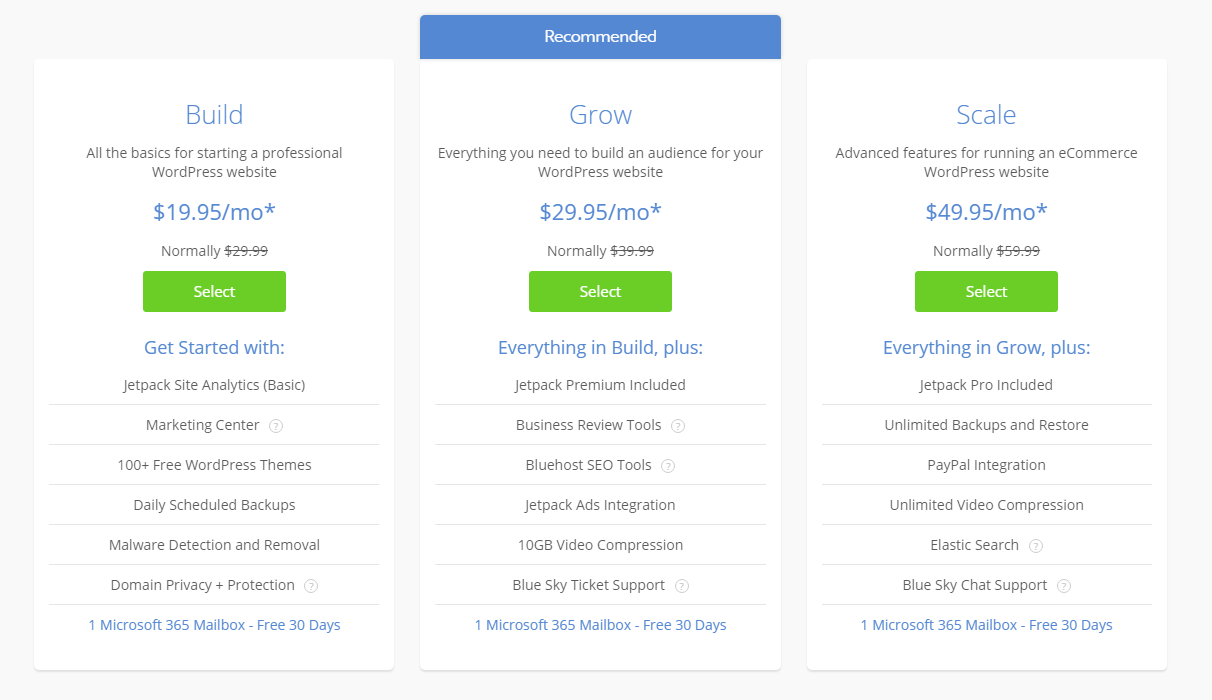
Image credit: Bluehost
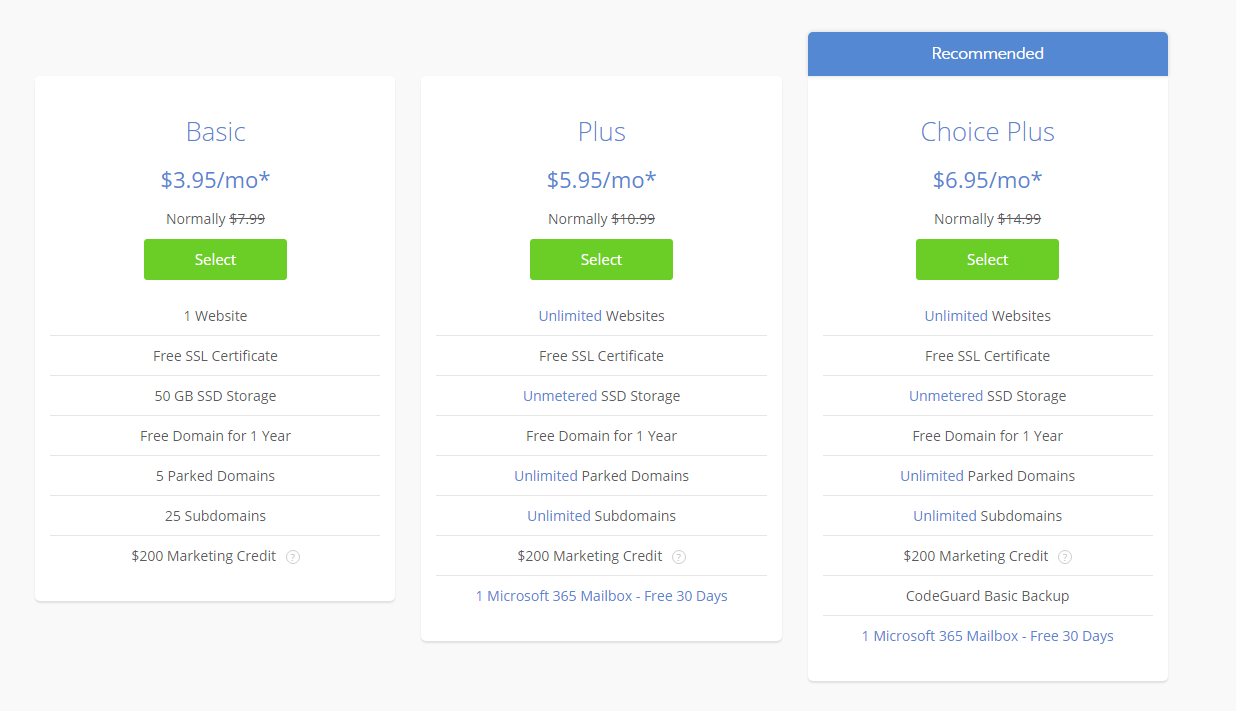
Managed plan cost: $29.99/month ($19.99 promotional)
Image credit: Bluehost
WP Engine: $25-$241/month (custom plans available)
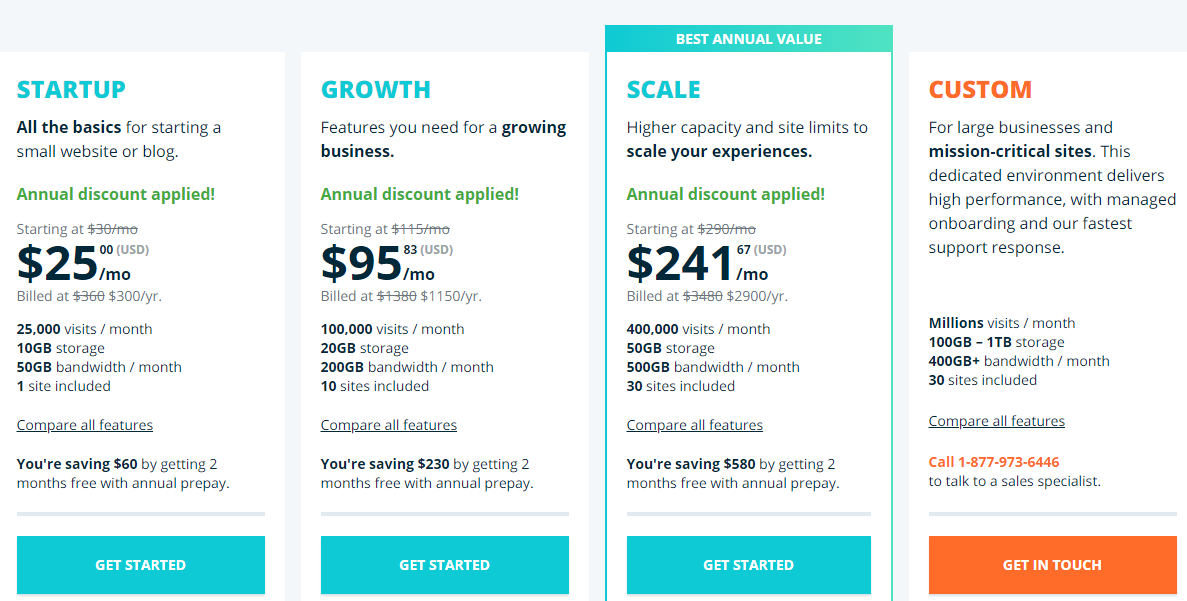
Image credit: WP Engine
Speed and Performance
With WP Engine, you do get greater load speeds and a generally sleeker performance. The difference isn’t a deal breaker, and you’ll still get a sturdy site using Bluehost, but if you’re able to afford the extra speed and performance, there’s no reason not to.
How much faster is WP Engine?
Some of your load time is going to depend on how you’ve set up your site, however, WP Engine’s baseline performance is stronger here than Bluehost’s.
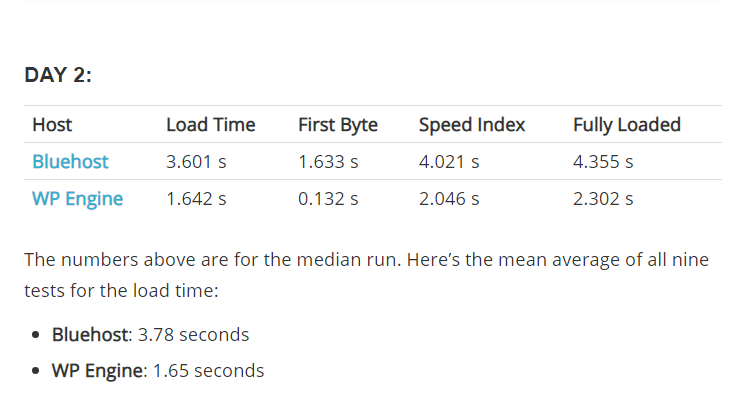
Image credit: Winning WP
Load time may be the single most important stat on your site. There are a lot of factors that impact load time, including what content you’re hosting and whether or not you’ve optimized your website code. WP Engine has a clear advantage for speed when it comes to loading WordPress sites, loading almost twice as fast as Bluehost’s shared hosting.
A slow loading website can affect how much a user trusts your site or business. Ideally your site should load in under three seconds, and for every additional second it takes, you could be losing up to 7 percent of your potential traffic.
If speed is your utmost priority, you may want to look at some of the newer hosting options available that may perform even better than WP Engine.
Which hosting service has more solid uptime, Bluehost vs WP Engine?
Uptime measures the time your website is online and functional. If your site goes down, you’re not making any money off it, and users may not return after experiencing problems. So it’s vital that your site has little, if any, downtime.
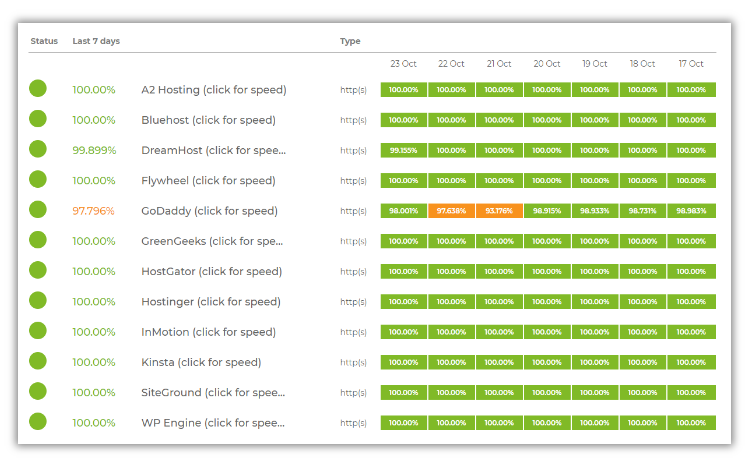
Image source: Theme Isle
Both Bluehost and WP Engine have comparable uptime performance. As you can see on this chart above, their uptime performance is identical. The difference between the two really comes down to load times.
Security
Security issues are part of what prompted hosting providers to start offering WordPress-specific hosting options in the first place. It’s vital that your information as well as your users’ data is protected when they visit your site.
Comparing security features: Bluehost vs WP Engine
Both Bluehost and WP Engine provide secure hosting for your site. However, WP Engine definitely makes security one of their main priorities, and they offer additional security features that Bluehost does not.
Bluehost’s managed WordPress hosting provides malware protection and removal.
- Web application firewall
- SSL/TLS
- SiteLock Security
WP Engine has Global Edge Security, which includes:
- Enterprise-grade threat detection and prevention via managed a managed web application firewall.
- High network capacity to protect against distributed DDoS attacks
- SSL/TLS
- Global performance via Cloudfare’s CDN
This is in addition to the security features on WP Engine’s platform, which include:
- Managed core updates
- Two-factor authentication
- Daily backups
- Automatic deactivation of non-secure plugins
As you can see, security is important to both providers, and you won’t be signing up for un-secure hosting with either option. However, WP Engine has put a lot of emphasis on security. If security is a big concern for your site, then WP Engine may be worth the investment. For example, an eCommerce site where you process a lot of personal payment information may benefit from WP Engine’s extra security measures.
Customer Support
Choosing the best web host for online business means more than just comparing raw stats. You’ll want to look for a service that’s user-friendly, as well. Customer support is vital to smoothly running your site. There are going to be problems that come up with any website and being able to quickly and easily get them resolved is so important. With poor customer service, you could end up wasting hours of your time on fixes that should only take a minute. And every hour you waste waiting on support is another hour your site isn’t working at its best.
Both Bluehost and WP Engine offer customer support, but WP Engine’s options are a bit more robust. Their starter plan has 24/7 chat support and higher tiered plans ($95/month and up) get phone support as well. While Bluehost also offers chat and phone support, they have discontinued their email-based support, making it difficult to solve more in-depth issues.
Half the battle is getting a hold of customer support in the first place, followed closely by making sure you’re talking to someone who knows what they’re doing.
Features
As we’ve discussed, the managed hosting plan for Bluehost isn’t much less expensive than the lower tier options from WP Engine. So if you’ve decided on managed WordPress hosting, which provider you go with is going to depend on what features are most important to you.
Here are the most prominent features that differ between the two companies.
WP Engine
WP Engine supports site migration
While I migrating your website to a new hosting service can get tricky, it is more than doable with the right tools. And as a general rule, migrating from Bluehost to WP Engine is going to be easier than the other way around. This is because WP Engine subscriptions come with a plugin option that automates nearly all of the migration process for you.
So if you’re not starting from scratch, but are instead updating the online business you’ve already started, then WP Engine will offer you a smoother experience. You can pay extra at Bluehost to have their employees run a complete migration for you, and the price tag is $149.99 for up to 5 websites. So it’s up to you if you’d rather spend that money on a one-time migration or several months’ worth of a premium hosting service.
Note: Bluehost also offers a one-time free site migration with each hosting package, however, only some websites qualify for this feature.
WP Engine has daily backups
WP Engine creates a backup for your site nightly. This is extremely important so you don’t risk losing data or progress. Bluehost also backs up your site daily, weekly and monthly. The difference is that Bluehost does not guarantee these backups and you should not rely on them.
WP Engine offers a dedicated content delivery network (CDN)
Having a CDN means a static copy of your site is held on multiple servers within a diverse network. This basically means that people all around the world can access your website faster, and this is one of the ways WP Engine gets a leg up over Bluehost in site performance, speed and access.
However, if your site is small, does not have a large amount of media files or you are only targeting an audience within a single country, having a CDN may be a bit like paying a limo driver to take your child to school every morning.
WP Engine has a customizable plan
While Bluehost offers more pre-packaged plan options than WP Engine, that doesn’t mean WP WP Engine isn’t flexible. They do have a custom plan option where you can speak with a specialist about your site’s specific needs. This option is targeted towards web teams working for larger companies rather than a small one-person operation.
Bluehost
Bluehost has options for shared hosting
If your site is low-traffic, then shared hosting is a reasonable way to save a lot of money. With shared hosting, you can expect slightly slower load times and a bigger risk of downtime as you’re sharing the server with many other websites. However, you can still get decent hosting services through Bluehost using this method, and you’ll be free to use your choice of plugins and you can even host sites that aren’t WordPress.
Bluehost offers free domain registration
You get your domain name for free even with the lowest tier Bluehost subscription. While domain names are usually not very expensive, the hassle of navigating a site like domain.com or godaddy.com and avoiding all their upsells can be a hassle. Think of this as a nice little perk, like the coupons that you find at the bottom of a fast food receipt.
Bluehost offers site staging
While WP Engine offers this service, as well, it’s worth noting that most shared hosting options don’t usually offer staging. On your staging site, you can give all changes to your website a sort of dry run, hopefully spotting any mistakes before your customers have a chance to see them. Getting this feature from a lower-cost hosting service like Bluehost is a great deal.
What sites should use Bluehost?
Bluehost is the clear winner for low budget projects. If your site is lower traffic, then there’s no need for an expensive WP Engine plan or even one of the pricier Bluehost options.
Because Bluehost offers cheaper shared hosting options for both WordPress sites and other site types, it gives you the option of starting cheaply with them and then upgrading later if your site begins to grow. Bluehost can take good care of you if you run one of the following sites:
- Personal site/blog
- Affiliate site
- Lower traffic eCommerce store
You can sign up for a Bluehost plan for only $3.95/month.
That said, if you have the budget for WP Engine, there’s no reason not to start off with managed WordPress hosting. If you can afford it, then I highly recommend going the managed route as it will save you a lot of time and headache down the road.
What sites should use WP Engine?
WP Engine can get pricey, and while it is powerful, a lot of its bells and whistles may be largely unnecessary for someone looking to start an online business without the backing of a whole dev team. WP Engine is a great hosting service for enterprise-level websites and high-traffic blogs or eCommerce stores. You should strongly consider WP Engine if you:
- Run a large business
- Are starting a business you expect to scale exponentially and quickly
- Need a unique customized plan
Conclusion: Choosing the best web host for online business
Both Bluehost and WP Engine offer great WP hosting options for blogs, eCommerce stores and general websites. The difference really does come down to size, scalability and budget. What are your long term needs?
WP Engine is going to give you more room to scale right off the bat and offers no budget options for a smaller site just starting out. Bluehost has more options, many of which are cheaper, but does not offer quite as many bells and whistles as the higher-end WP Engine plans.
Choosing Bluehost
Go with Bluehost (shared hosting) if you:
- Have a small budget
- Do not need managed hosting
- Want to install and manage your own themes and tools
If you don’t mind installing themes and other website tools on your own and doing a lot of extra legwork, then you can save a significant amount of money with Bluehost. But again, if you’ve got the funds then managed hosting from WP Engine is the better bet.
A more mature business, for example, would definitely want to go with WP Engine. A small business just starting out on a shoestring budget should probably sign up with Bluehost. Bluehost is also a viable option if you want to get your hands dirty in the nitty gritty of running a website. And remember, Bluehost does offer managed WordPress hosting services, which you can migrate up to later on down the road.
Choosing Bluehost Managed
Go with Bluehost (managed hosting) if you:
- Smaller budget
- Site that your business doesn’t doesn’t depend on
- Usability
- Additional security options aren’t necessary to run your site
Managed Bluehost hosting works really well if you run a coaching or consulting website or if your business is blogging. Bluehost is a very friendly option with a high level of usability.
Choosing WP Engine
Go with WP Engine if you:
- Have a larger budget
- Own a business that is
- Need faster speeds
- Need more robust support services
- Want a completely managed hosting experience right away
- Need a customized plan
WP Engine, on the other hand, may be the smarter choice for more advanced businesses with greater bandwidth needs and slightly higher budget. If you want speed, security, and backups all baked in from the start, WP Engine has more of the bells and whistles that make things run seamlessly.
WP Engine is the best web hosting for an online business if you’re starting out with a web development team and you have the need and time for WP Engine’s more robust features list. WP Engine is a slightly safer choice if your business’s livelihood is directly tied to your website’s functionality, security and uptime. You can sign up for WP Engine here.
Remember, your website is the face of your online business, so take your time and choose the hosting option that’s right for you. You can check out our hosting comparison piece to learn more about hosting options and all-in-one site builders.